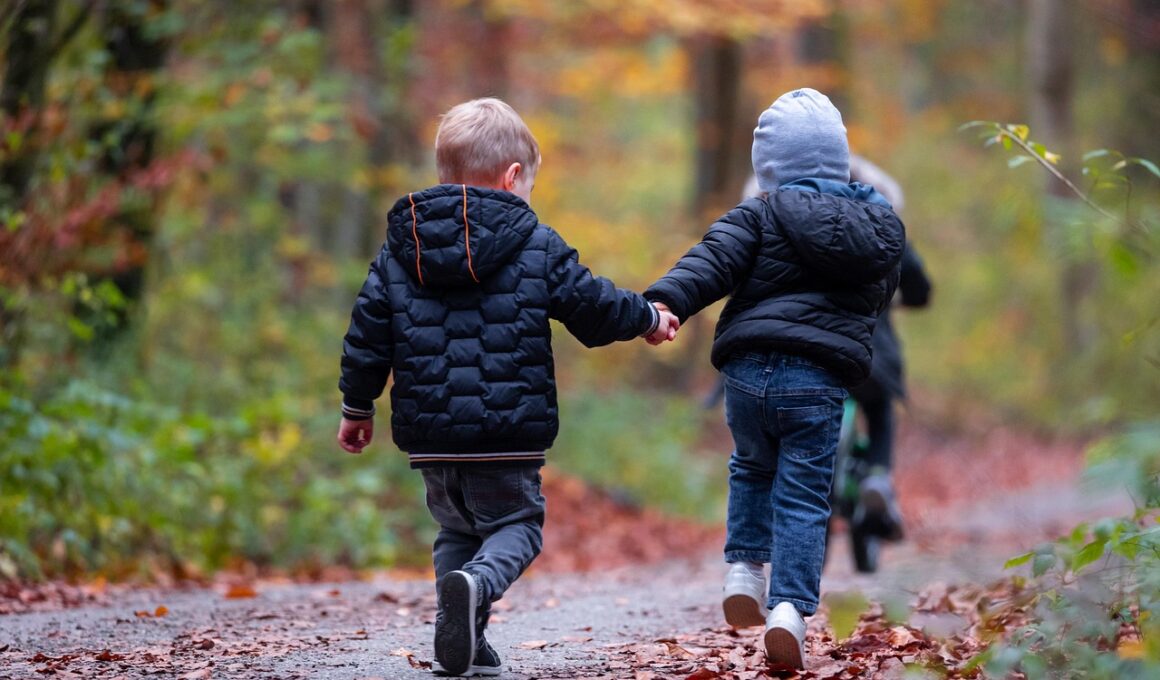Benefits of Trail Running for Children’s Physical and Mental Health
Trail running offers exceptional physical benefits for children, encouraging them to be active outdoors. As kids traverse uneven terrains, they develop improved coordination and balance, which are crucial for overall physical development. Running on trails involves navigating various obstacles, helping strengthen their leg muscles and core. Additionally, the varied natural elements, such as rocks and roots, challenge their agility and reflexes, stimulating physical resilience. Regular participation in trail running can significantly enhance cardiovascular health, as it promotes better heart function and lung capacity. It can also build endurance over time, allowing children to keep up with other activities. Moreover, engaging in physical activity outside fosters an appreciation for nature, encouraging a sustainable lifestyle. It instills a sense of adventure in kids and cultivates a love for the outdoors. Moreover, running in such environments often leads to a decreased likelihood of sedentary behavior, augmenting their overall fitness levels. Trail running enables children to explore their physical capabilities, pushing boundaries, and discovering their own strength. Parents and guardians can encourage this activity within family settings, thus setting an example for a healthy, active lifestyle.
Aside from physical health, trail running significantly contributes to mental well-being in children. Studies reveal that outdoor exercise, such as running, reduces symptoms of anxiety and depression. As children navigate trails, their minds often clear, providing a sense of escape from everyday pressures, thus promoting mental clarity. The rhythmic nature of running paired with fresh air creates a meditative experience, helping to relieve stress. Additionally, spending time in nature has been linked to improved mood and increased feelings of happiness. The beauty and tranquility of natural settings provide children a healing atmosphere, far removed from the hustle and bustle of city life. Furthermore, running on trails often includes social elements, whether with parents, friends, or running groups, which can enhance social skills and connections. These experiences contribute to their emotional growth, helping build strong friendships founded on shared interests. This sense of community enhances feelings of belongingness and reduces isolation. Participating in regular trail running gives kids something to look forward to, fostering a positive outlook on life. Overall, the mental advantages gained from this activity are invaluable for children during their formative years.
Building Confidence Through Trail Running
Trail running can serve as an excellent vehicle for building self-esteem and confidence in children. As they learn to conquer different terrains and obstacles, their sense of achievement enhances their belief in their abilities. Completing a challenging trail or reaching a particular distance provides immense satisfaction, and this accomplishment is crucial for fostering a positive self-image. Moreover, overcoming fears associated with trail running—such as rough paths or steep inclines—teaches resilience. By facing and addressing these challenges, children learn the importance of persistence and hard work. In addition, the goal-setting aspect of trail running encourages children to set and achieve personal targets. Whether it’s increasing distance or improving speed, these milestones cultivate a growth mindset. Parents can actively participate by celebrating their accomplishments, reinforcing the positive feelings associated with their efforts. As children experience success, they become more willing to take on new challenges, both in running and in life. In essence, trail running becomes more than just a physical activity; it evolves into a powerful tool for personal growth, inspiring children to reach for higher peaks in their lives.
Moreover, trail running encourages children to appreciate teamwork and cooperation. Group running activities, such as family hikes or school clubs, enable kids to bond while running together. This camaraderie instills essential social skills such as collaboration, communication, and support. Understanding how to cheer for peers or offer help during difficult portions of the route is invaluable in building meaningful relations. These experiences create lasting friendships and memories, as children enjoy the thrill of shared challenges. Additionally, trail running can also introduce members of diverse backgrounds, building a sense of inclusion and understanding. Participating in broader trail running events or community races can immerse kids in a rich tapestry of cultures and perspectives. This unity is crucial for developing empathy and respect for others, which are valuable traits in today’s connected world. Engaging in this shared pursuit cultivates a rich sense of community, fostering interest in teamwork and collective achievements. Such experiences lay the groundwork for positive relationships as they grow. Through trail running, children learn to appreciate the beauty of shared experiences, enhancing their social development.
Enhancing Cognitive Functions Through Natural Environments
Engaging in trail running not only benefits children’s physical and mental health, but it also presents opportunities to enhance cognitive functions. Studies suggest that being active outdoors facilitates cognitive development and sharpens focus. The variations in natural landscapes require children to constantly think and make quick decisions about their paths. This mental engagement, coupled with physical activity, can stimulate brain activity and improve attention spans. Additionally, navigating through trails often entails observing the environment, improving children’s spatial awareness and critical thinking. Regular exposure to natural settings helps reduce symptoms of attention deficit issues by allowing for deeper focus. This immersive experience contributes to memory retention and boosts problem-solving abilities too. Significantly, learning to assess risks while trail running enhances decision-making skills, further equipping children for academic challenges. Parents can incorporate fun educational activities during trail runs, such as identifying plants or analyzing landscapes, making running a multifaceted learning experience. Overall, the cognitive benefits accrued through these experiences are profoundly enriching, proving that trail running is a holistic approach to a child’s well-being, offering both mental engagement and physical exercise.
The accessibility of trail running adds to its attractiveness for children. With minimal equipment required, running can occur almost anywhere, providing a flexible fitness option for families. Children can start off running on simple trails near home, requiring only a good pair of shoes. This convenience makes it easier for families to integrate outdoor exercise into their daily routines. Various groups and organizations often host children’s trail running events, offering more structured environments where novice runners can participate. Community involvement encourages parents to explore different trails together, thus strengthening family bonds. Outdoor parks, local nature reserves, and scenic routes provide a multitude of safe running places for kids to discover. These scenic environments inspire children to venture beyond familiar settings, instilling a sense of adventure. Furthermore, local organizations may offer workshops or clinics that teach essential trail running skills, ensuring a safe experience. These attractions foster a supportive community around trail running, keeping children motivated to persist. Overall, this sport provides not only excitement but also a healthy avenue for shared experiences with family and peers.
The Importance of Proper Training and Safety
While the benefits of trail running are substantial, it is crucial to prioritize proper training and safety measures for children. Understanding how to run correctly and safely on trails minimizes the risk of injuries. Parents should emphasize the importance of warming up and cooling down, teaching kids to prepare their bodies for the demands of the activity. Enrolling children in trail running workshops or training programs can provide valuable guidance on techniques and form. Proper footwear and clothing appropriate for varying weather conditions further ensure a safe experience. Teaching children to read trail signs and recognize their surroundings enhances their navigation skills, fostering independence. When children grasp the concept of personal limits, they foster an understanding of their capabilities. It’s equally vital to establish a buddy system for group runs, as this flow ensures safety and encouragement. Discussing hydration and nutrition strategies post-run is also essential to promote recovery and overall health. Safety measures profoundly enhance the trail running experience, ensuring that children are prepared and aware of their environment. Effective training contributes to a fulfilling and exciting journey through the wonderful world of trail running.
In conclusion, trail running offers multifaceted benefits to children’s physical and mental health, thus encouraging parents to embrace this activity as a vital part of their lives. The combination of physical fitness and mental clarity gained through outdoor activity is invaluable for developing young minds and bodies. From boosting confidence and building social skills to enhancing cognitive function and emotional well-being, the rewards are plentiful. The sense of adventure adapted from trail running serves to inspire children, enabling them to discover new strengths and resilience in their lives. To maximize these benefits, it is vital to engage in proper training and safety measures. Trail running not only fosters a love for nature but also promotes an active lifestyle, laying the foundation for healthier habits into adulthood. Creating family memories, building friendships, pushing personal limits, and gaining education from the environment are all incredible experiences associated with this pursuit. Therefore, families are encouraged to take those first steps into the trails, unlocking the full potential of trail running. Ultimately, trail running enriches children’s lives—creatively, physically, and mentally—paving the way for a brighter future.


